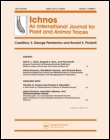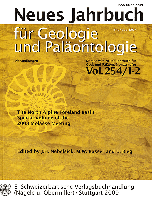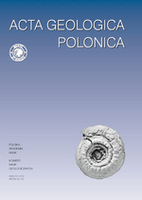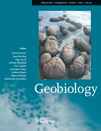
ICHNOS-AN INTERNATIONAL JOURNAL FOR PLANT AND ANIMAL TRACES
metrics 2024
Connecting the Dots: Understanding Ecological History Through Traces
Introduction
ICHNOS: An International Journal for Plant and Animal Traces is a premier scholarly journal published by Taylor & Francis Inc, focusing on the intricate field of paleontology. With an ISSN of 1042-0940 and an E-ISSN of 1563-5236, this journal serves as a vital platform for the dissemination of high-quality research centered on the traces left by plants and animals throughout geological history. Established in 1990 and with a convergence period extending to 2024, ICHNOS holds a Q3 category ranking in Paleontology according to the 2023 quartiles, positioning it within the 48th percentile of its Scopus-rank peer group. Although it does not currently offer Open Access options, the journal remains a valuable resource for researchers and professionals seeking to deepen their understanding of trace fossils and their implications for paleoecological studies. By contributing critical insights into the evolutionary chronicle of life on Earth, ICHNOS plays an essential role in advancing the dialogue within the earth and planetary sciences community.
Metrics 2024
 0.37
0.37 0.80
0.80 1.00
1.00 43
43Metrics History
Rank 2024
Scopus
IF (Web Of Science)
JCI (Web Of Science)
Quartile History
Similar Journals

CARNETS DE GEOLOGIE
Unveiling Earth's Secrets, One Study at a TimeCarnets de Geologie is a prominent open-access journal dedicated to the dynamic fields of geology, paleontology, and stratigraphy. Published by Carnets Geologie and based in France, the journal has been a platform for scholarly communication since 2002, facilitating unrestricted access to high-quality research. With a robust impact reflected in its 2023 quartile rankings—Q2 in Geology, Paleontology, and Stratigraphy—Carnets de Geologie ranks favorably within Scopus, positioning itself at the 60th percentile for Earth and Planetary Sciences. The journal aims to disseminate innovative research findings and foster academic discourse among researchers, professionals, and students interested in the intricate aspects of Earth's history and processes. Encompassing a broad scope that reflects continuous developments in the geological sciences, Carnets de Geologie is dedicated to advancing knowledge and understanding within its community.

NEUES JAHRBUCH FUR GEOLOGIE UND PALAONTOLOGIE-ABHANDLUNGEN
Unearthing Insights from the PastNEUES JAHRBUCH FUR GEOLOGIE UND PALAONTOLOGIE-ABHANDLUNGEN, published by E SCHWEIZERBARTSCHE VERLAGSBUCHHANDLUNG, is a distinguished scholarly journal based in Germany that has made significant contributions to the field of Earth and Planetary Sciences with a particular emphasis on Paleontology. With its ISSN: 0077-7749, this journal provides an essential platform for researchers, professionals, and students to explore cutting-edge research and developments that enhance our understanding of geological and paleontological processes. Boasting a robust ranking of #67 out of 113 in Scopus for the category of Earth and Planetary Sciences and achieving a Q3 quartile ranking in Paleontology, it stands as a significant resource in the global academic community. Though not an open-access journal, it offers valuable insights from 1987 onwards, ensuring a comprehensive archive of high-quality research articles published from 1995 to 2024. Its scholarly impact continues to resonate, making it a vital reference point for advancements in the ever-evolving disciplines of geology and paleontology.

ACTA GEOLOGICA POLONICA
Innovative research shaping the landscape of geology.ACTA GEOLOGICA POLONICA is a distinguished journal published by the Polska Akademia Nauk, in collaboration with the University of Warsaw's Geology Department. Since its inception, it has served as a vital platform for disseminating innovative research in the field of Geology, reflecting a commitment to advancing scientific knowledge in Earth and planetary sciences. With an ISSN of 0001-5709 and an E-ISSN of 2300-1887, this journal provides a rigorous review process and is classified in the Q3 quartile for Geology as of 2023, indicating its growing influence in the discipline. Despite not being open access, the journal facilitates meaningful contributions that span a range of geological topics from fundamental research to applied sciences, thereby enriching the academic landscape. Researchers, professionals, and students alike are encouraged to engage with the valuable findings and discussions contained within its pages, which continue to shape the future of geological inquiry.

BULLETIN OF THE GEOLOGICAL SOCIETY OF DENMARK
Unveiling the Layers of Earth's SecretsBULLETIN OF THE GEOLOGICAL SOCIETY OF DENMARK, published by the Geological Society of Denmark, serves as a key platform for the dissemination of original research and comprehensive reviews related to geological studies in Denmark and beyond. With an ISSN of 2245-7070, this journal provides a significant avenue for sharing findings that contribute to our understanding of geological processes, resources, and the history of the Earth. Although it operates under traditional access options, the journal encourages a rich scholarly dialogue among researchers, professionals, and students alike. Its impact is evident in the broad scope it covers, catering to diverse areas of geology, including but not limited to sedimentology, paleontology, and environmental geology. By fostering an environment of knowledge sharing, the BULLETIN OF THE GEOLOGICAL SOCIETY OF DENMARK is not just a journal; it is a vital resource for anyone invested in advancing geological science.

JOURNAL OF IBERIAN GEOLOGY
Pioneering research in the realm of Iberian geology.JOURNAL OF IBERIAN GEOLOGY, published by Springer International Publishing AG, is a pivotal platform dedicated to advancing the field of geology and stratigraphy. With an ISSN of 1698-6180 and E-ISSN of 1886-7995, this journal has earned its reputation in the academic community, holding a commendable Q2 ranking in both Geology and Stratigraphy for 2023, reflecting its contributions to contemporary geological research. Spanning from 2007 to 2024, it provides a comprehensive forum for scholars and practitioners from around the globe to disseminate their findings pertaining to the Iberian Peninsula, enhancing the understanding of regional geological phenomena. The journal has carved out a significant niche within the Earth and Planetary Sciences, ranking #137 out of 321 in Geology and #24 out of 55 in Stratigraphy, indicating its wide-reaching impact and scholarly engagement. The Journal of Iberian Geology serves as an indispensable resource for those interested in the complexities of geological structures, stratigraphic sequences, and the broader implications of geological research, making it a vital reference for researchers, professionals, and students alike.

BULLETIN OF GEOSCIENCES
Connecting Research to Global Geological ChallengesBULLETIN OF GEOSCIENCES, published by the prestigious Czech Geological Survey, stands as a pivotal resource in the fields of Earth and Planetary Sciences and Environmental Science. Since its inception in 2003, the journal has been committed to advancing knowledge through high-quality research, currently holding a commendable Q2 ranking in both disciplines. With its focus on diverse and innovative topics, BULLETIN OF GEOSCIENCES provides an essential platform for researchers, professionals, and students aiming to disseminate and access impactful studies. The journal is indexed in Scopus, ranking #78/195 in General Earth and Planetary Sciences and #110/233 in General Environmental Science, reflecting its significant contribution to academia. Publishing from Prague, Czech Republic, this journal invites contributions that illuminate the interactions between geological processes and environmental phenomena, ensuring an inclusive and accessible approach to crucial global issues.

Geobiology
Connecting Biology and Geology for a Sustainable FutureGeobiology, published by WILEY, is a prestigious journal at the forefront of interdisciplinary research in Earth and Planetary Sciences, Ecology, and Environmental Science. With an ISSN of 1472-4677 and an E-ISSN of 1472-4669, this journal has achieved remarkable recognition as evidenced by its Q1 categorization in multiple relevant fields, including Earth and Planetary Sciences, Ecology, and Environmental Science, according to the 2023 quartile rankings. Covering a diverse range of topics from biogeochemical cycles to the impacts of climate change on biodiversity, Geobiology serves as a vital platform for researchers, professionals, and students alike. The journal boasts impressive Scopus rankings, placing it within the top tiers of its fields, which is indicative of its significant influence and contribution to advancing knowledge. Although it does not operate under an Open Access model, Geobiology ensures widespread reach and accessibility, allowing for impactful dialogues within the scientific community. Researchers are encouraged to submit their findings and engage with cutting-edge studies to advance our understanding of the interplay between biological and geological processes.

Stratigraphy
Decoding Earth's History Through Fossil RecordsStratigraphy is a distinguished journal dedicated to advancing the field of paleontology and stratigraphic research. Published by MICRO PRESS in the United States, this journal is accessible via its ISSN 1547-139X and E-ISSN 2331-656X, providing an essential platform for researchers, professionals, and students alike. With a robust focus on the intricate relationships between geological time and the fossil record, Stratigraphy aims to disseminate high-quality research that enhances our understanding of Earth’s history. Its ranking within the 2023 Q2 category of paleontology reflects its commitment to scholarly excellence, as noted by a Scopus ranking of #65 out of 113 in the Earth and Planetary Sciences domain, placing it in the 42nd percentile. Although not open access, the journal's valuable contributions from 1988 to 2024 encourage a collaborative dialogue among the scientific community, underscoring the significance of stratigraphic studies in environmental and evolutionary research.

Depositional Record
Elevating interdisciplinary dialogue in sedimentology and beyond.Depositional Record, published by WILEY, stands as a vital resource for researchers and professionals in the fields of Geology, Paleontology, Oceanography, and Environmental Science. Since its inception in 2015, this Open Access journal has been dedicated to advancing the understanding of sedimentary processes, depositional environments, and their implications on Earth's history and contemporary climate dynamics. With an impressive array of categorizations, including Q1 rankings in Geology, Paleontology, and Stratigraphy, it underscores its significant contribution to these scientific arenas. The journal’s reach is reflected in its Scopus rankings, placing it within the top quartiles in multiple categories, indicating the high quality and impact of its published research. Researchers, students, and professionals who engage with Depositional Record will find a treasure trove of knowledge aimed at informing best practices, innovative studies, and fostering an interdisciplinary dialogue crucial for environmental stewardship and geological exploration.

JOURNAL OF THE PALAEONTOLOGICAL SOCIETY OF INDIA
Unearthing India's Rich Paleontological HeritageThe JOURNAL OF THE PALAEONTOLOGICAL SOCIETY OF INDIA, published by SAGE PUBLICATIONS INDIA PVT LTD, stands as a significant resource in the field of paleontology, dedicated to disseminating high-quality research and findings from the Indian subcontinent and globally. With an ISSN of 0552-9360, this journal has established itself within the academic community, particularly as it converges its publication years from 2011 to 2024. Ranking in the Q4 category of paleontology as of 2023, it serves an essential niche for researchers and students interested in the historical biological records and evolutionary processes. Despite its current Scopus ranking of #88 out of 113 in the Earth and Planetary Sciences category, the journal plays a pivotal role in fostering scholarly dialogue and advancing the understanding of paleontological sciences in India and beyond. Researchers are encouraged to contribute to this evolving field and share their findings, solidifying the journal's commitment to highlighting significant paleontological research contributions.